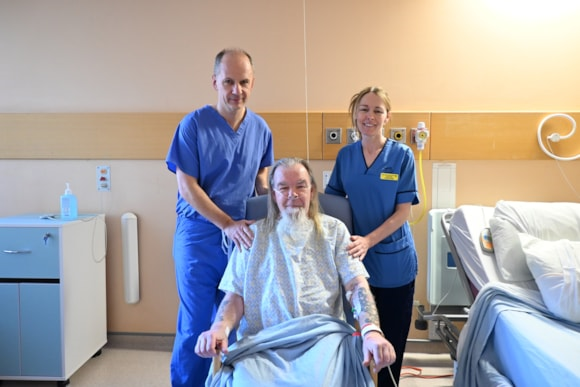New Oxygen Therapy trial could be a ‘game-changer’ for heart attack patients in Scotland in world first

A pioneering study into a new treatment that could transform the way heart attacks are treated in Scotland and beyond is under way in a world first.
Consultants at the Golden Jubilee University National Hospital have recruited the first patients to a clinical trial testing supersaturated oxygen (SSO₂) therapy — a novel approach aimed at reducing heart damage following a ST-segment elevation myocardial infarction (STEMI), one of the most severe types of heart attack.
Heart and circulatory diseases remain one of Scotland’s biggest health challenges, causing around 18,000 deaths annually — nearly 50 every day.
STEMIs are a major cause of heart failure and premature death and current standard treatment involves inserting a stent to reopen the blocked artery.
This trial adds a one-hour SSO₂ infusion immediately after the stent is placed, delivering highly oxygenated blood to the heart to minimise tissue damage.
NHS Golden Jubilee Director of Research, Professor Colin Berry, and Dr Francis Joshi, Consultant Cardiologist, are leading the study funded by the British Heart Foundation and sponsored by NHS Golden Jubilee, in partnership with the University of Glasgow.
Professor Berry said: “Early studies suggest that SSO₂ therapy can enhance heart muscle recovery after a heart attack, potentially reducing the risk of heart failure.
“SSO₂ is usually given via access from the leg. Our study, which is the first of its kind in the world, will assess the feasibility of SSO₂ therapy given via the arm. If our study returns favourable results then patients with the most severe types of heart attack could benefit.
“In this case, fewer heart failure episodes that might enhance survival in the highest risk patients.”
The therapy uses a wrist-accessed catheter system to circulate and oxygenate the patient’s blood through an external machine before returning it to the body - a technique that has been approved in Europe, but not yet adopted in the UK for this purpose.
The study aims to enrol 56 patients over 3 years and patient Stewart Thornton, 61, from Ayrshire, was the first to enrol after treatment at the Golden Jubilee following a major heart attack earlier this year while in his local shop.
He said: “I hadn’t had any heart problems before although I do have scarred lungs after being born with pneumonia and my heart wasn’t functioning properly on one side.
“Taking part in this study does give me some peace of mind as it could help me in the future and, if it can help me, then it could help others too, so I am really happy to be involved in it and hope it can make a difference.”
Dr Joshi added: “This project brings together innovation by researchers in the University of Glasgow, industry and the NHS enabled by vital support from the British Heart Foundation and Scottish Government to deliver potentially life-saving advancements to patients in need.”
Professor Bryan Williams, Chief Scientific and Medical Officer at the British Heart Foundation, said: “Thanks to research, more people now survive a heart attack than ever before. But this means that many people are living with damaged hearts, putting them at risk of developing heart failure.
"We urgently need new treatments that can help doctors to reduce this irreparable heart damage. It's early days, but this innovative study could be the first step towards a new therapy that can help to limit damage after a heart attack, allowing more people to live longer lives in good health."


